Shopify vs Hostinger Website Builder: Final verdict
Shopify and Hostinger Website Builder both offer unique advantages, but they cater to different needs and user bases.
Shopify (Overall Grade: 8.1/10)
is a robust ecommerce platform designed for businesses looking to scale. It excels in providing comprehensive ecommerce features, advanced marketing tools, and strong security measures. When comparing Shopify vs Hostinger Website Builder, Shopify is ideal for users who need a powerful, growth-oriented solution with extensive integrations and support for high-volume online stores.
Hostinger Website Builder (Overall Grade: 7.1/10)
is a user-friendly platform that makes website creation accessible to everyone. It offers a wide array of design features and templates, making it perfect for beginners and small businesses. Considering Shopify vs Hostinger Website Builder, Hostinger Website Builder is a great choice for those who prioritize ease of use, affordability, and a straightforward website building experience.

|

|
|
|---|---|---|
Design functionalities & templates |
8.2 |
8.5 |
Ease of use |
7.5 |
8.3 |
Ecommerce |
9.2 |
6.1 |
Website Editors |
7.9 |
7.4 |
Product testing options |
8.1 |
6.7 |
Price |
8.2 |
9.0 |
Hosting quality |
9.0 |
7.2 |
Website speed optimization |
7.8 |
8.2 |
Plugins and integrations |
8.7 |
4.7 |
Marketing features |
8.8 |
5.8 |
Customer support |
8.6 |
7.2 |
Security |
9.0 |
8.2 |
AI capabilities |
7.9 |
6.1 |
User Management |
6.5 |
6.3 |
Which one is the best for ecommerce: Shopify or Hostinger Website Builder?
 9.2
9.2
 6.1
6.1
Verdict
: Hostinger Website Builder is suitable for small businesses and individual sellers, while Shopify is the preferred choice for more comprehensive and scalable ecommerce solutions.
Shopify
: With a score of 9.2, Shopify excels in providing a robust set of ecommerce features. It offers advanced tools for product management, payment processing, and order fulfillment, making it ideal for businesses looking to scale. Shopify’s extensive app library and advanced customization options further enhance its ecommerce capabilities, making it a top choice in the Shopify vs Hostinger Website Builder comparison.
Hostinger Website Builder
: Scoring 6.1, Hostinger Website Builder offers basic ecommerce functionalities suitable for small-scale operations. It provides essential tools for setting up an online store, including product catalog management and payment gateways. However, it lacks the advanced features and scalability that Shopify offers, making it less suitable for larger or rapidly growing businesses.
Which one is the best for informational and business websites?
 6.8
6.8
 7.9
7.9
Verdict
: Hostinger Website Builder is the better choice for informational and business websites, offering a more user-friendly experience and a wider range of design options compared to Shopify.
Shopify
: Shopify, with a score of 6.8, is primarily an ecommerce platform. While it can be used for informational sites, its features are more geared towards online stores. The platform offers sleek and professional templates, but its complexity might be overwhelming for users looking to create simple informational websites. Shopify’s editor is optimized for ecommerce, making it less flexible for non-ecommerce purposes.
Hostinger Website Builder
: Scoring 7.9, Hostinger Website Builder excels in creating informational and business websites. It offers a drag-and-drop interface, real-time editing, and AI-powered tools, making it easy for users without coding knowledge to build their sites. The platform provides over 140 customizable templates across various categories, ensuring design flexibility and mobile responsiveness. When comparing Shopify vs Hostinger Website Builder, Hostinger’s user-friendly approach and extensive design options make it the preferred choice for informational websites.
Shopify vs Hostinger Website Builder: Detailed comparison
Design functionalities & templates
Design FunctionalitiesRepresents how well each platform allows for creative design and customization of websites.Score Components:
- Template Variety (30%): Range and quality of design templates.
- Customization (30%): Flexibility and options for design alterations.
- User Interface (20%): Ease and intuitiveness of the design process.
- Responsiveness (10%): Adaptability to different devices and screen sizes.
- Innovation (10%): Unique design features and tools.
 8.2
8.2
 8.5
8.5
🏆
Winner: Hostinger Website Builder.
If you’re looking for a platform that offers more creative control, a wider array of design features, and a larger collection of templates, Hostinger Website Builder is the preferred choice.
Shopify’s templates are sleek and professional, ideal for ecommerce sites. They offer a sophisticated look with a focus on online stores. While the free template selection is not large, Shopify’s premium theme store provides a variety of industry-specific options, offering advanced features for a strong brand presence.
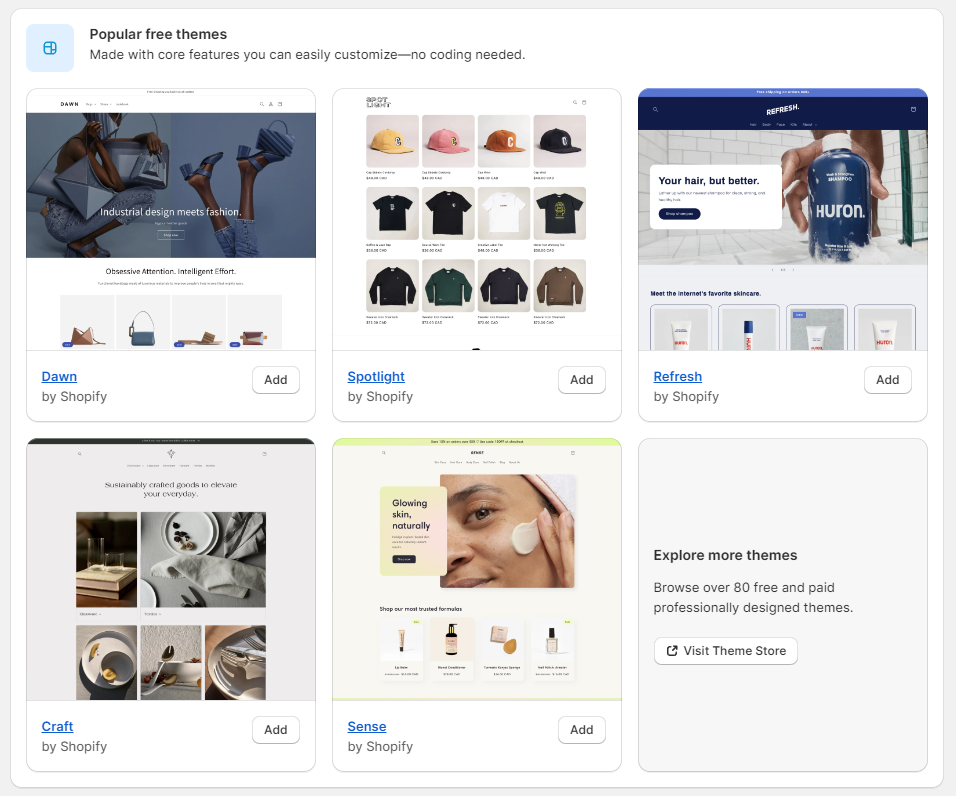
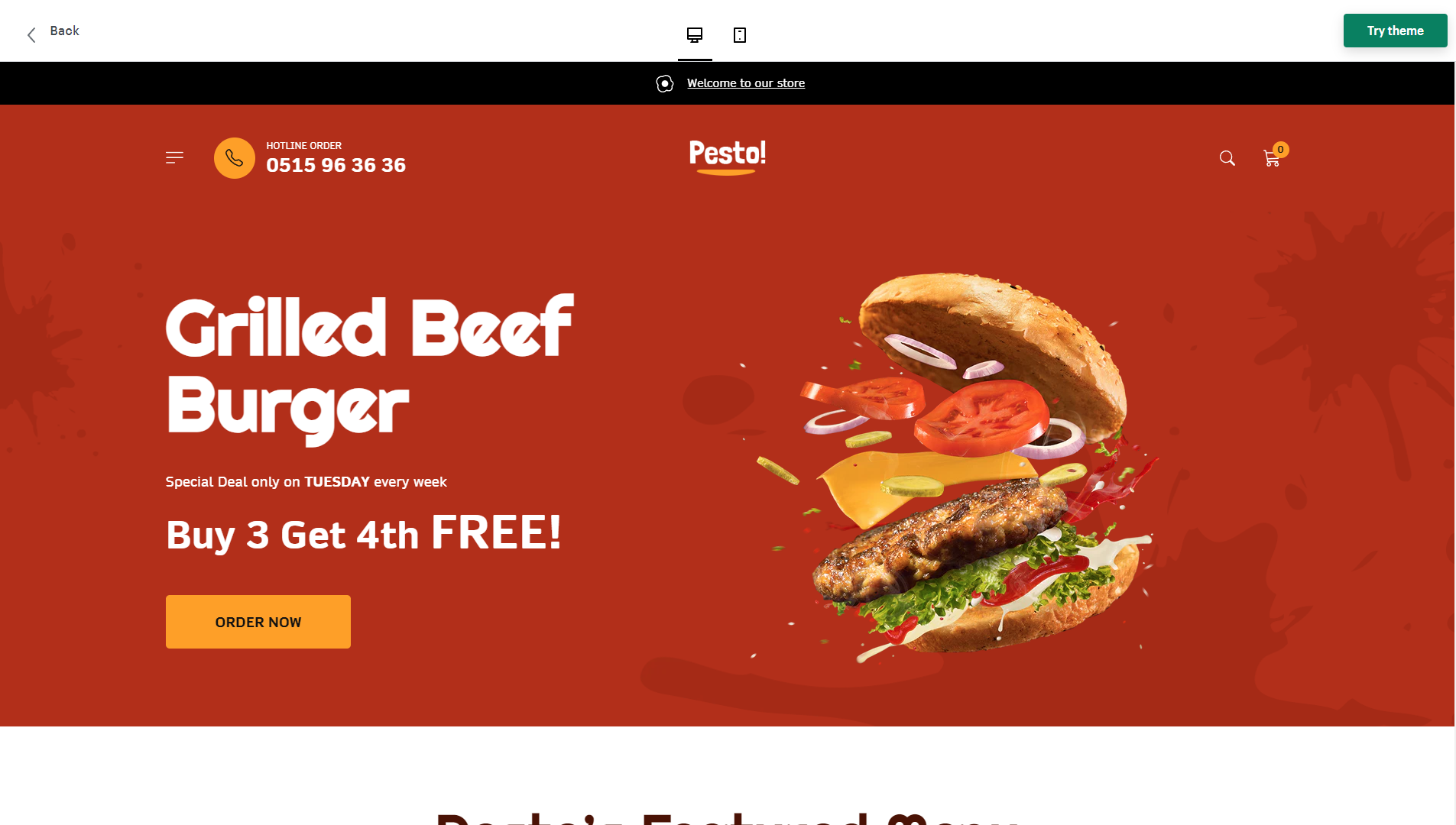
Compared to Shopify, Hostinger Website Builder offers an extensive collection of over 140 templates across various categories, including business, portfolio, blog, ecommerce, restaurant, and landing pages. These templates are fully customizable, providing design flexibility with the ability to adjust colors, fonts, layouts, and incorporate unique brand elements, while ensuring mobile responsiveness for optimal viewing on all devices.
Hostinger Website Builder Themes
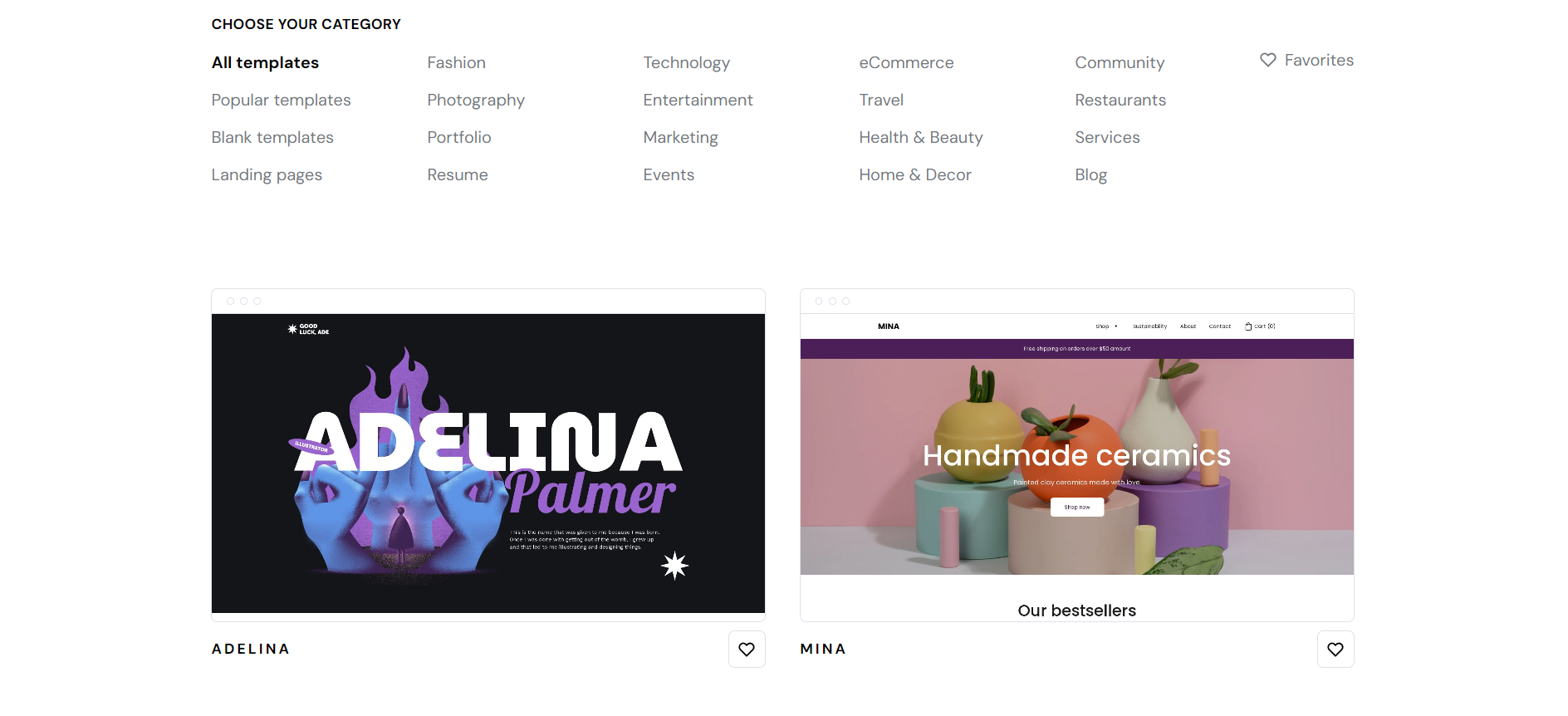

Get a head start on website creation with AI
Create a custom website tailored to your business needs 10X faster with 10Web AI Website Builder!
Ease of use
Ease of useReflects the platform’s overall user-friendliness.Score
Components:
- Learning curve (40%): Quickness and ease of getting started.
- Interface design (30%): Simplicity and intuitiveness of layout.
- User guidance (20%): Quality of tutorials and support.
- Flexibility (10%): Adaptability to various user skills.
 7.5
7.5
 8.3
8.3
🏆 Winner: Hostinger Website Builder
. With a score of 8.3, Hostinger Website Builder edges out Shopify (7.5) in terms of ease of use. Its user-friendly approach, featuring a drag-and-drop interface, real-time editing, and AI-powered tools, makes it an ideal choice for those seeking a straightforward website creation experience.
Learning Resources
🏆 Winner: Shopify
. Both platforms offer solid learning resources, but Shopify’s extensive library of articles, tutorials, webinars, and video courses, focusing primarily on setting up and managing online stores, provides a more comprehensive learning experience for users.
For ecommerce
EcommerceMeasures the platform’s effectiveness in supporting online business activities.Score Components:
- Ecommerce themes and templates (20%): Variety and design of templates.
- Product management (25%): Ease of managing and organizing products.
- Payment options (25%): Variety and convenience of payment methods.
- Ecommerce features (20%): Features for managing an ecommerce store.
- Integration (10%): Compatibility with external e-commerce tools and services.
 9.2
9.2
 6.1
6.1
Shopify, with a score of 9.2, is a leading ecommerce platform that provides a comprehensive set of features for online businesses. It offers tools for creating and customizing online stores, managing products, processing payments, and handling order fulfillment.
On the other hand, Hostinger Website Builder, scoring 6.1, provides basic ecommerce capabilities for setting up an online store, including product page creation, category management, payment integration, order processing, and promotional features. While suitable for small businesses and individual sellers, it has limitations such as a more basic feature set, fewer integrations, and potential scalability challenges compared to dedicated ecommerce platforms like Shopify.
 |
 |
|
|---|---|---|
Ecommerce themes and templates |
8.2 |
6.5 |
Product page customization |
8.5 |
5.8 |
Payment processing and commissions |
8.8 |
7.0 |
POS capabilities |
8.1 |
4.5 |
Payment gateways |
9.5 |
7.5 |
Product numbers |
9.0 |
6.0 |
Additional ecommerce features |
9.1 |
6.2 |
Shopify ecommerce features:
- Comprehensive store builder
- Shopify Payments and other gateways
- Advanced inventory management
- Multi-channel selling
- Abandoned cart recovery
- Detailed analytics and reporting
Hostinger Website Builder ecommerce features:
- Product Catalog Management
- Inventory management
- Taxes and shipping
- Payment gateways
- Order management
- Discount coupons and promotions
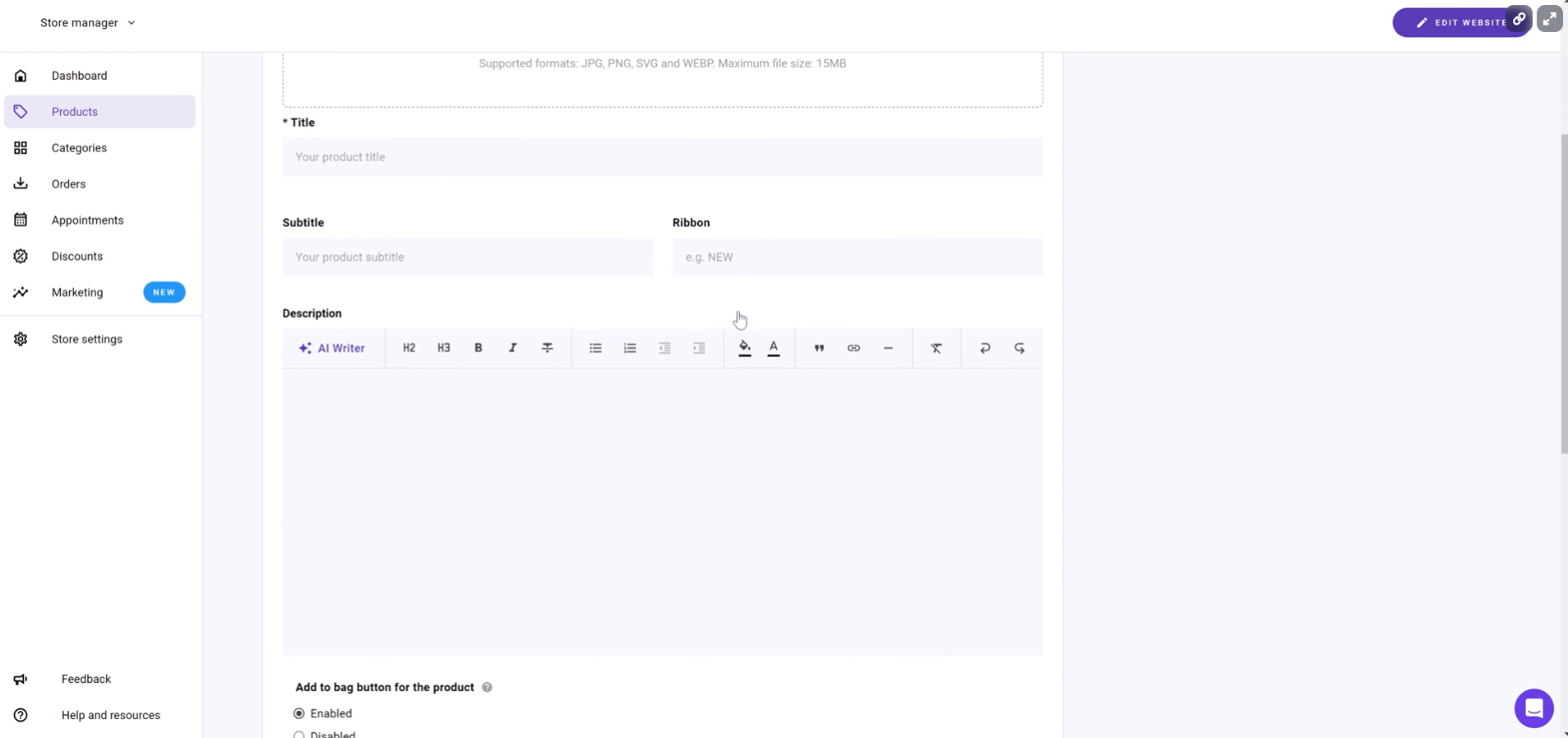
Ecommerce themes & templates
Shopify offers about 150 modern responsive themes for creating a virtual storefront, ensuring a good look on both desktop and mobile devices. While some themes are free, others cost between $170 to $380. In contrast, Hostinger Website Builder provides over 50 ecommerce templates out of its library of 140+, covering various styles and industries.
These mobile-responsive templates offer pre-built functionalities such as product pages, shopping carts, and wishlists, but compared to dedicated platforms, the selection may feel smaller, and customization options might be more limited. Additionally, some advanced ecommerce features may not be available in all templates.
Product page customization
Shopify has a limit of three options per product, totaling 100 unique variations. This limit may not pose a significant constraint, and it is suggested that for products with numerous options, creating separate listings on Shopify can be a more manageable approach.
While Shopify offers titles, descriptions, and image galleries with zoom effects, customization options like adding ribbons, size charts, and wishlists are not as straightforward. However, Shopify distinguishes itself with additional features through its extensive library of extra apps, offering functionalities like reviews, Facebook stores, eBay item importers, and a unique Augmented Reality feature for an enhanced customer experience.
In Hostinger Website Builder, product page customization includes editing basic elements, adjusting layout and design, and optimizing SEO settings. However, compared to dedicated ecommerce platforms, it falls short in terms of flexibility due to limited code access, restrictions on creating entirely new custom sections, and theme-specific limitations. Additionally, Hostinger offers fewer add-ons and integrations for advanced product page features, such as reviews and wishlists.
Payment processing
When it comes to payment processing, Shopify offers payments with typical charges of
2.9% + 30¢
per online transaction on basic plans, and lower fees for higher-tier plans. However, it adds extra fees for using other payment gateways. Shopify Payments is Shopify’s own payment processing gateway. It allows merchants to accept credit card payments directly on their store without having to integrate third-party payment providers. This simplifies the payment process, reduces transaction fees, and streamlines the handling of finances.
Hostinger Website Builder provides basic ecommerce features, supporting popular payment gateways like PayPal, Stripe, and Square with no additional platform commissions on sales. However, it lacks built-in payment processing and integrated point-of-sale capabilities, necessitating reliance on third-party gateways and separate systems for in-person transactions. The platform supports various payment gateways, and users should refer to the Hostinger website for a comprehensive list based on their location and plan.
Website Editors
Website EditorsEvaluates the platforms’ website building and editing capabilities.Score Components:
- Customization tools (40%): Range and power of editing features.
- Editor usability (30%): User experience within the editor.
- Design flexibility (20%): Freedom in layout and design changes.
- Update and maintenance ease (10%): Simplicity of updating and maintaining the site.
 7.9
7.9
 7.4
7.4
🏆
Winner: Shopify
. Shopify’s editor, with a score of 7.9, excels in providing a streamlined, ecommerce-focused editing experience. It’s particularly beneficial for users who prioritize efficient management of online stores. The editor is straightforward, making it easy to add products, manage inventory, and set up payment methods. Shopify’s editor is optimized for sales and business growth, with built-in tools specifically designed for ecommerce businesses.
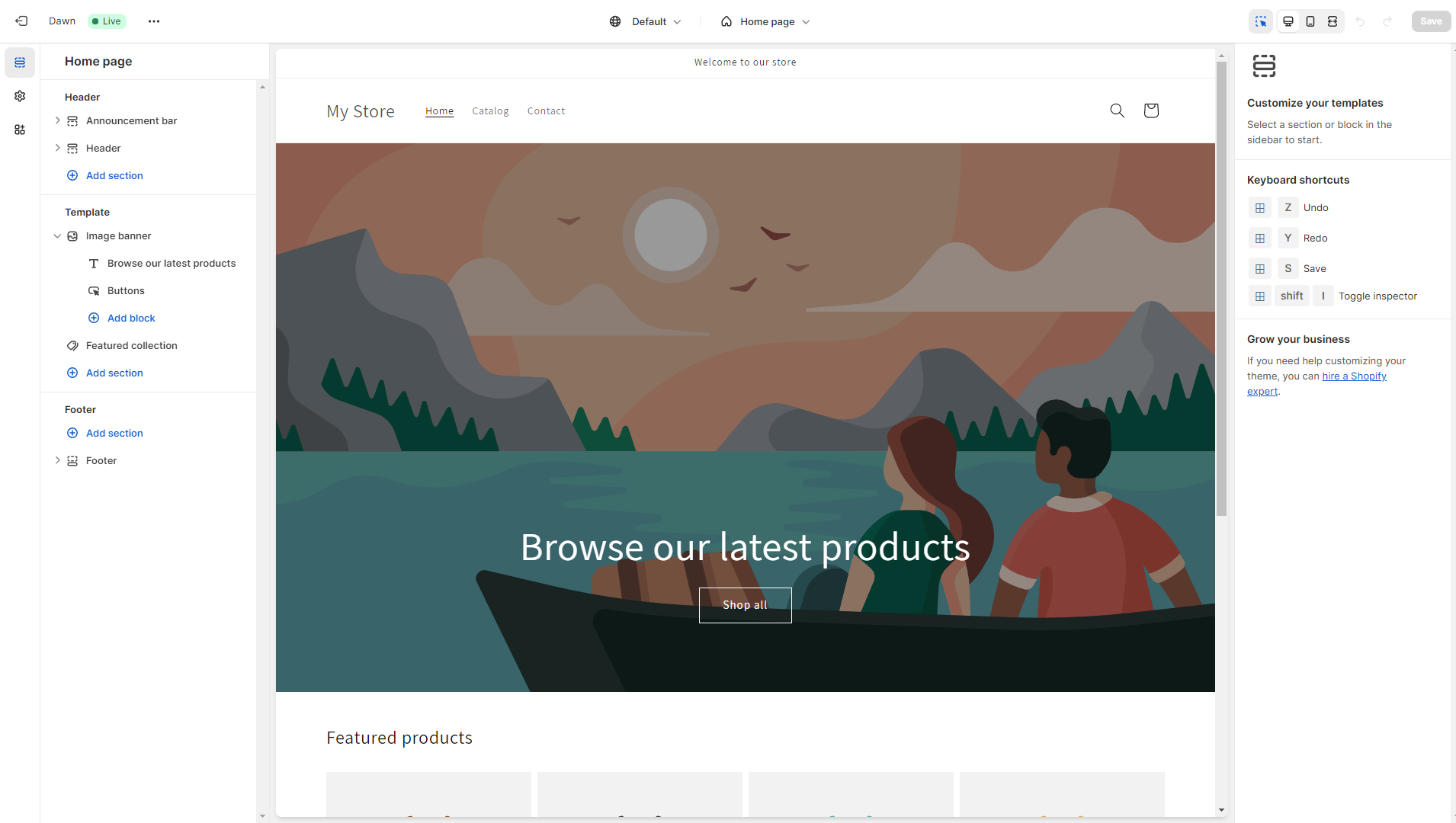
Hostinger Website Builder’s editor, scoring 7.4, is a beginner-friendly platform with a drag-and-drop interface, pre-designed templates, and visual aids for easy website creation. It offers various sections, content editing tools, SEO optimization, and ecommerce capabilities on premium plans, but has limitations in design flexibility compared to code-based platforms and may have fewer advanced features for high-volume stores. Customization options also vary based on the chosen plan.
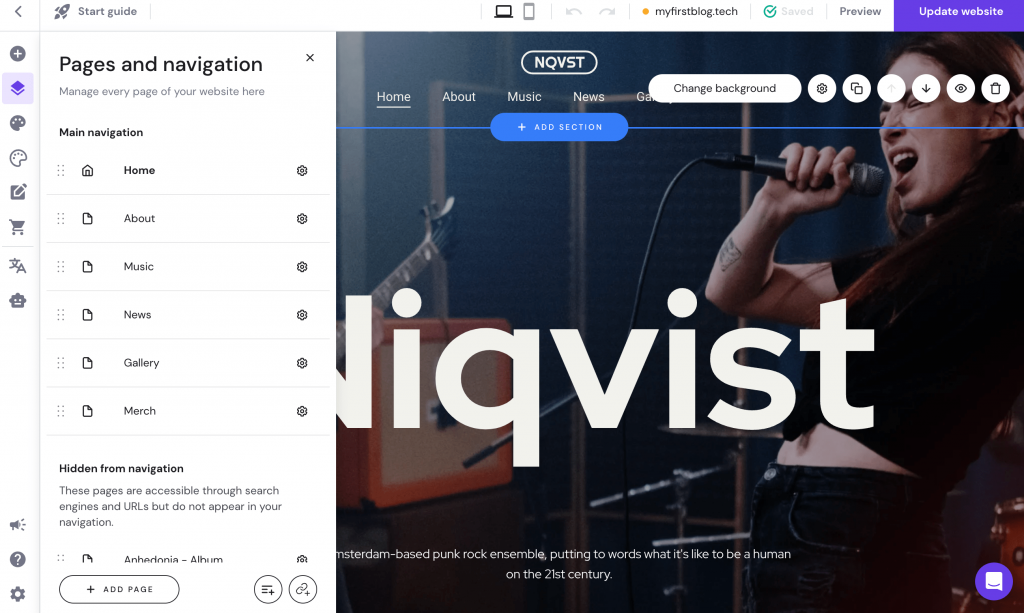
Mobile editor/app
 8.0
8.0
 5.5
5.5
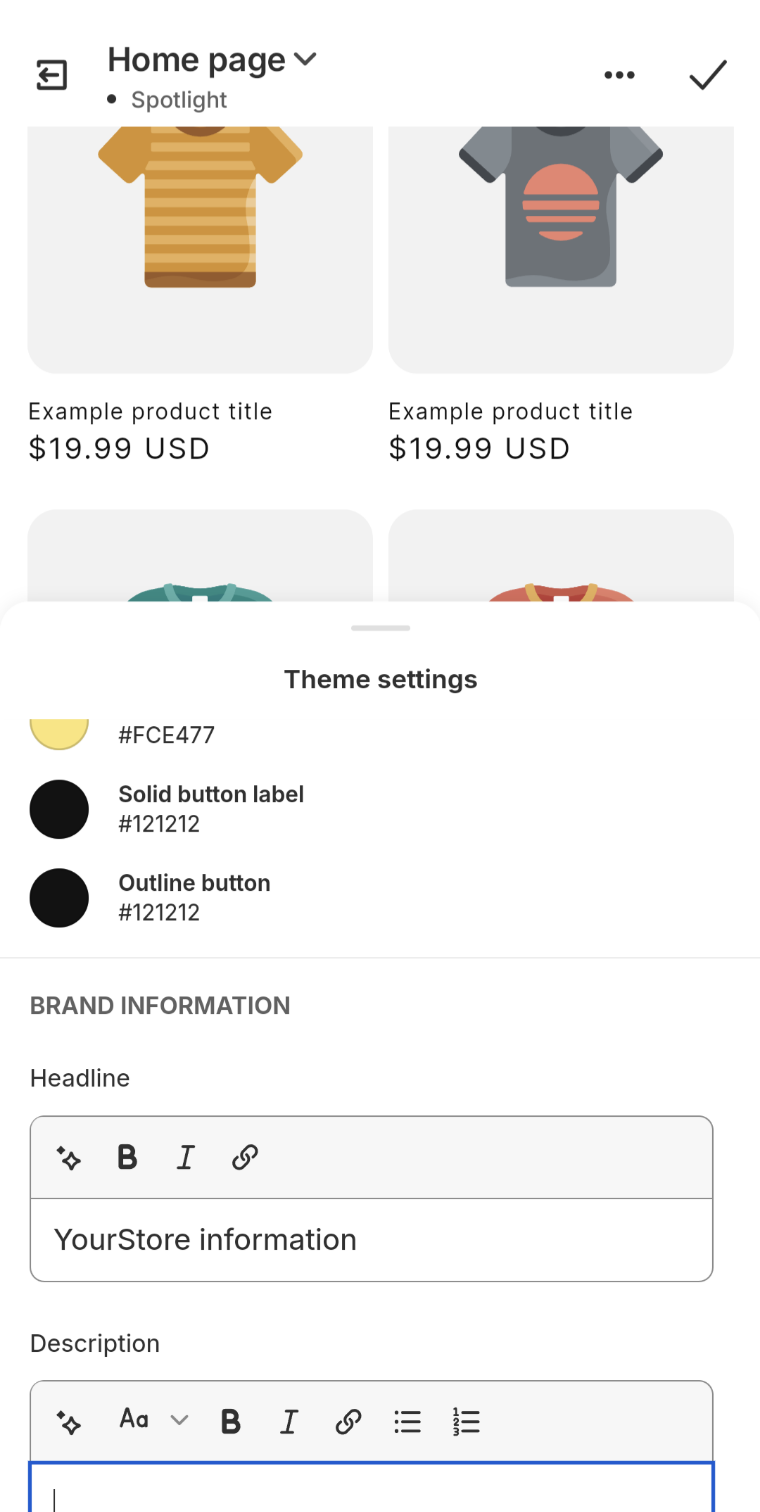
🏆
Winner: Shopify
. Both Shopify and Hostinger Website Builder offer mobile-friendly interfaces, but they cater to different needs and skill levels. Shopify has a dedicated mobile app that allows users to customize their online store directly from their mobile device. This feature enables the addition, removal, editing, and rearrangement of content on the store’s website, offering convenient on-the-go adjustments to the store’s appearance and layout.
On the other hand, Hostinger Website Builder does not have a dedicated mobile editing app. Its website builder offers a mobile-friendly interface that is directly accessible through your phone’s web browser. However, without a dedicated app, it may not provide the same level of convenience and functionality as Shopify’s mobile app.
In summary, Shopify receives a higher rating due to its dedicated mobile app and the convenience it offers for on-the-go adjustments, while Hostinger Website Builder’s mobile-friendly interface is accessible but may not provide the same level of convenience and functionality.
Product testing options
Product Testing OptionsAssesses the options for trying out platform features before commitment.Score Components:
- Trial quality (40%): Extent and usefulness of the trial or free version.
- Feature accessibility (30%): How many features are available to test.
- Trial duration (20%): Length of the trial period.
- Ease of transition (10%): Smoothness of moving from trial to paid plans.
 8.1
8.1
 6.7
6.7
Overall Result
:
Shopify wins
. Shopify scores 8.1, offering a 14-day free trial with access to all features. Hostinger Website Builder scores 6.7, with no free trial but a 30-day money-back guarantee.
 |
 |
|
|---|---|---|
Free Plan |
No | No |
Trial Duration |
14 days | No, however they have 30 days money back guarantee |
Testing Premium Features |
All features during free trial |
It is possible to test the premuim features during the 30 day refundable period. |
Price
PriceLooks at the cost-effectiveness and value for money of each platform.Score Components:
- Plan value (40%): What each pricing tier offers.
- Transparency and clarity (30%): Clearness of pricing structures.
- Flexibility of plans (20%): Range of options to suit different budgets.
- Hidden costs (10%): Additional expenses not included in the plan.
 8.2
8.2
 9.0
9.0
Hostinger Website Builder offers more affordable options and a higher discount on annual subscriptions, but Shopify offers more price plans and enterprise plans for larger-scale operations.

|

|
|
|---|---|---|
$10-$13 |
No offering at this amount. |
Premium website ($11.99/month): Build 1 website with 10 GB storage, 100 GB bandwidth, custom domain & email, social media integration & SEO tools. Value for price: 7.5 |
$13-$20 |
No offering at this amount. |
Business website builder ($13.99/month): Build 1 website with custom domain & emails, AI website builder, AI image generator, AI writer, ecommerce features, marketing integrations and 0% transaction fees. Value for price: 8.5 |
$20-$30 |
Shopify Basic ($29/month): Unlimited products, 2.9% + 30¢ card fee with Shopify payments, Extra 2% gateway fee without Shopify Payments, Abandoned cart recovery, Automated sales tax, Digital products, POS Integration, 2 staff accounts. Value for price: 8.0 |
No offering at this amount. |
$70-$80 |
Shopify Standard ($79/month): Lower card fees (2.6% + 30¢), Gift cards, Professional reports, 5 staff accounts. Value for price: 8.5 |
No offering at this amount. |
$200+ |
Advanced Shopify ($299/month): Lowest card fees (2.49% + 30¢), Advanced report builder, Real-time carrier shipping, Up to 15 staff accounts Value for price: 8.8 |
No offering at this amount. |
location. As a result in rare cases the prices displayed here can differ from the ones you see on their
websites.
Hosting quality
Hosting
qualityExamines the reliability and performance of the hosting solutions.Score Components:
- Uptime (40%): Consistency and reliability of website availability.
- Speed (30%): Loading times and performance.
- Bandwidth and storage (20%): Sufficiency of resources provided.
- Data centers (10%): Quality and distribution of hosting infrastructure.
 9.0
9.0
 7.2
7.2
Winner: Shopify
. Shopify’s proprietary cloud-based hosting, with a 99.99% uptime guarantee and 5 global data centers, is designed for high-traffic online stores. Hostinger Website Builder, on the other hand, offers a variety of hosting types with a 99.9% uptime guarantee and data centers across the globe. While Hostinger Website Builder provides a versatile hosting service, Shopify’s specialized e-commerce hosting earns it a higher rating.
 |
 |
|
|---|---|---|
Do they offer hosting? |
Yes, included in all paid plans |
Yes, included in all paid plans |
Data Centers: |
5 globally: USA (Ashburn, Virginia; Santa Clara, California), Canada (Toronto, Ontario), Ireland (Dublin), and Singapore |
Data Centers across the globe: USA, Europe, Asia, South America |
Type of hosting: |
Proprietary cloud-based hosting |
Shared Hosting, Cloud Hosting, WordPress Hosting, VPS Hosting |
Uptime: |
99.99% |
99.9% |
Uptime Guarantee: |
Yes, 99.99% |
Yes, 99.9% |
Website Speed Optimization
Website Speed OptimizationEvaluates optimization of website loading timesScore Components:
- PageSpeed Score (30%): Google’s score indicating performance optimization.
- Loading Time (30%): The average time until a website is fully interactive.
- Mobile Optimization (15%): Optimization effectiveness for mobile devices.
- Resource Optimization (15%): Optimizing images, scripts, and other heavy resources.
- CDN Usage (10%): Use of CDN to enhance speed across geolocations.
 7.8
7.8
 8.2
8.2
🏆 Winner: Hostinger Website Builder
Both Shopify and Hostinger Website Builder prioritize website performance and page speed. However, Hostinger Website Builder edges out Shopify in this category due to its use of LiteSpeed Cache, Cloudflare CDN, MariaDB database, and browser caching for speed optimization.
 |
 |
|
|---|---|---|
Focus |
App optimization, Google AMP |
LiteSpeed Cache, Cloudflare CDN, MariaDB database, Browser caching |
Performance Tools |
Google Lighthouse, PageSpeed Insights |
Google PageSpeed Insights Integration |
Key Strategies |
App efficiency, Theme optimization |
LiteSpeed Cache, Cloudflare CDN, MariaDB database, Browser caching |
Load Times |
Varies widely, dependent on optimization |
2-3 seconds average |
Page Speed Scores Range |
Scores vary; influenced by apps, images |
80-95+/100 |
Core Web Vitals Improvement |
Emphasis on LCP, FID, CLS improvements |
Significant improvements in overall CWV scores through LiteSpeed Cache, Cloudflare CDN, server-side optimizations, and CSS optimizations |
Hostinger Website Builder has made significant strides in enhancing website performance and page speed. It uses LiteSpeed Cache and Cloudflare CDN to reduce the Largest Contentful Paint (LCP), server-side optimizations to improve the First Input Delay (FID), and CSS optimizations to minimize the Cumulative Layout Shift (CLS). These efforts have led to significant improvements in overall Core Web Vitals (CWV) scores. The average load times for Hostinger Website Builder are 2-3 seconds, and the PageSpeed scores range from 80 to 95+ out of 100.
Shopify, on the other hand, focuses on app optimization and Google AMP for speed optimization. The load times for Shopify vary widely and are dependent on optimization. The PageSpeed scores also vary and are influenced by apps and images. Shopify places an emphasis on improving the LCP, FID, and CLS for Core Web Vitals.
Get a head start on website creation with AI
Create a custom website tailored to your business needs 10X faster with 10Web AI Website Builder!
Plugins and integrations
Plugins and integrationsMeasures the range and effectiveness of additional plugins and integrations.Score Components:
- Variety of options (40%): Range of available add-ons.
- Integration smoothness (30%): Ease of integrating plugins into the site.
- Quality of plugins (20%): Functionality and reliability of the options.
- Custom integration capabilities (10%): Support for custom or third-party integrations.
 8.7
8.7
 4.7
4.7
🏆 Winner: Shopify.
With a score of 8.7, Shopify outperforms Hostinger Website Builder, which scores 4.7. Shopify offers over 8,000 apps in its App Store, covering a wide range of functionalities. These apps come with various pricing options, including free, paid, freemium, and one-time payment models.
On the other hand, Hostinger Website Builder relies on add-ons for additional functionality, offering around 20 free options in categories such as marketing, forms, website functionality, design, and SEO. While basic needs are covered with free add-ons, premium ones are available for individual purchase, ranging from $0.99 to $19.99 each. Alternatively, users can opt for Pro and Business plans starting at $10.99 per month, which include bundled premium add-ons along with hosting, with the Business plan offering more features and ecommerce capabilities.
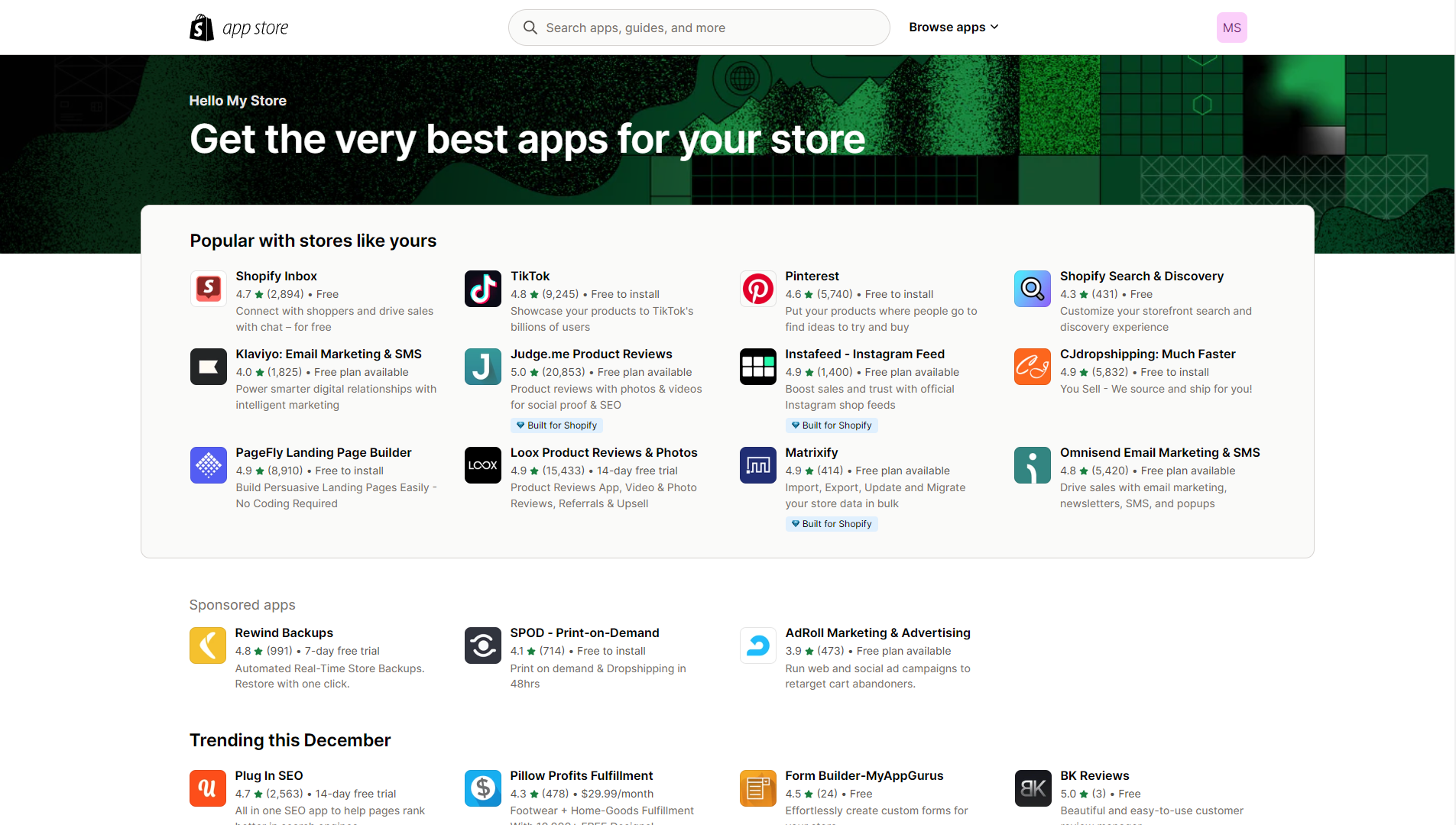
Marketing Features
Design FunctionalitiesRepresents how well each platform allows for creative design and customization of websites.Score Components:
- Template Variety (30%): Range and quality of design templates.
- Customization (30%): Flexibility and options for design alterations.
- User Interface (20%): Ease and intuitiveness of the design process.
- Responsiveness (10%): Adaptability to different devices and screen sizes.
- Innovation (10%): Unique design features and tools.
 8.8
8.8
 5.8
5.8
🏆
Overall Winner: Shopify
. Shopify stands out for its more advanced ecommerce-focused marketing tools, especially in analytics and ad campaign management. Hostinger Website Builder provides basic marketing tools and relies more on third-party integrations.
 |
 |
|
|---|---|---|
SEO Tools |
||
Email Marketing |
✓ (via third-party integrations) |
|
Blogging |
||
Social Media Integration |
Advanced integration for selling directly on social platforms |
Simple social media links and sharing options |
Analytics and Reporting |
Detailed analytics for in-depth insights |
Basic analytics for website traffic and performance |
Ads and Promotions |
Google Ads integration; sophisticated ad campaign management |
Limited direct ad tools but supports integrations for ad management |
Customer Support
Customer supportEvaluates the quality and availability of support options.Score Components:
- Response time (40%): Speed of support responses.
- Support quality (30%): Effectiveness and helpfulness of the support.
- Availability (20%): Range of support channels (phone, chat, email).
- Resource richness (10%): Quality of self-help and educational materials.
 8.6
8.6
 7.2
7.2
🏆 Winner: Shopify
. Comparing Shopify vs Hostinger Website Builder, Shopify takes the lead in this category with its 24/7 customer support available through chat, email, and phone. Shopify’s extensive community forums and clear tutorials further enhance the support experience, making it easier for users to find solutions quickly. Additionally, Shopify offers a dedicated support program for enterprise-level businesses, including a dedicated account manager and priority support.
Hostinger Website Builder also provides robust customer support with 24/7 live chat, a ticketing system for email responses within 24 hours, and phone support during specified hours. While Hostinger’s support is comprehensive, it lacks the enterprise-level support options that Shopify offers, making Shopify the better choice for businesses seeking extensive and round-the-clock assistance.
Security
SecurityLooks at the platforms’ security measures and data protection.Score Components:
- Data protection (40%): Safeguards for user and customer data.
- SSL and encryption (30%): Implementation of secure connections.
- Compliance (20%): Adherence to industry security standards.
- Regular updates (10%): Frequency of security updates and patches.
 9.0
9.0
 8.2
8.2
🏆
Winner: Shopify
. Shopify’s security measures are comprehensive and robust, offering secure infrastructure, encryption, and limited access to data. They comply with data privacy regulations and practice data minimization. Additional security measures include two-factor authentication, regular audits, and a dedicated incident response team. Shopify also ensures website security with SSL certificates and a built-in Web Application Firewall.
Hostinger Website Builder, while offering a range of security measures such as encryption, regular backups, advanced firewalls, DDoS protection, and anti-malware scans, places more responsibility on the user for managing and protecting visitors’ data. This might require additional effort and vigilance from the user’s side.
AI Capabilities
AI capabilitiesMeasures the effectiveness of AI-driven features and tools.Score Components:
- Automation efficiency (40%): Impact of AI on streamlining processes.
- Personalization (30%): AI-driven customization for users or customers.
- AI-Assisted design (20%): Role of AI in website design and functionality.
- Data analysis (10%): Use of AI in interpreting user data and analytics.
 7.9
7.9
 6.1
6.1
 |
 |
|
|---|---|---|
Personalized Design |
AI-generated website layouts |
|
SEO Optimization |
AI-driven recommendations for better search engine visibility |
|
Customer Behavior Analysis |
Advanced analytics to understand customer preferences |
|
Sales Predictions |
AI-powered sales forecasting tools |
|
Inventory Management |
AI tools to assist in efficient inventory handling |
Smart stock management |
Content Generation |
AI-assisted content creation |
AI Writer tool for quick and easy content creation |
🏆 Winner: Shopify
. Shopify’s AI capabilities, particularly in the ecommerce domain, are more comprehensive and advanced. It excels in offering personalized shopping experiences, inventory management, and sales predictions. While Hostinger Website Builder’s AI capabilities are promising, they are more limited in scope and have certain limitations in terms of customization and uniqueness.
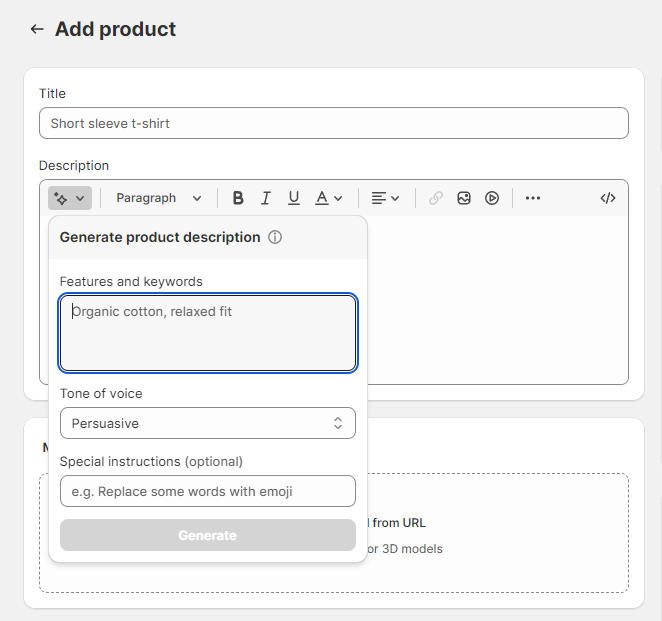
Shopify, with a score of 7.9, utilizes AI mainly to enhance the ecommerce experience. Its AI features focus on customer behavior analysis, personalized shopping experiences, inventory management, and sales predictions.
Hostinger Website Builder, with a score of 6.1, utilizes AI to automate aspects of website creation. However, it has limitations in terms of customization, uniqueness, and potential technical adjustments needed for accuracy.
User Management
User ManagementAssesses the platforms’ capabilities in managing user roles, permissions, and accessibility.Score Components:
- Role Customization (40%): Flexibility in creating and defining user roles and
permissions. - Ease of Management (30%): User interface and tools for managing users.
- Access Control (20%): Effectiveness of access control measures for different user
levels. - Scalability (10%): Ability to manage a growing number of users efficiently.
 6.5
6.5
 6.3
6.3
🏆 Winner: Shopify
. Managing your online team with Shopify and Hostinger Website Builder involves different approaches to website editing access.
- Shopify enforces staff account limits based on plans, ranging from 2 to 15, with Shopify Plus offering unlimited
accounts. Collaborators with limited access are also an option. - The number of users who can edit a Hostinger website depends on the hosting plan and the Website Builder edition chosen. For shared hosting, the Free plan allows only 1 user, Starter allows 2, Premium allows 5, and Business offers unlimited collaborators. In Cloud Hosting, Startup allows 2, Professional allows 5, and Enterprise offers unlimited collaborators. The Website Builder Pro edition, available on all plans, allows up to 10 collaborators.
Shopify User Roles and Access Levels:
| Role | Description | Access Highlights |
|---|---|---|
| Store Owner | Full control over store | Manage products, orders, discounts, payments, apps, settings. Create and manage staff accounts. |
| Staff | Configurable access by owner | Add/edit products, manage orders, fulfill orders, manage customers, update content. Access level can be customized by the owner. |
| Collaborator | Limited access for external partners | View and manage specific sections like blog or product categories. Cannot access full store settings. |
Additional Features
 |
 |
|
|---|---|---|
SSL Certificate |
||
Custom Domain |
||
Free Custom Domain Included |
||
International Domains |
||
Mobile Responsive |
||
Page Speed |
||
Website Builder Mobile App |
||
Convert a Website To An App |
||
Website Analytics |
||
Multilingual Sites |
||
Multiple Users |
Shopify vs Hostinger Website Builder: User Feedback
Shopify’s slightly higher rating on G2 Crowd can be largely attributed to its specialization in ecommerce. Its comprehensive features, ease of use, and robust customer support cater specifically to online businesses, leading to high user satisfaction among those seeking a dedicated ecommerce solution.
Hostinger Website Builder is favored for its ease of use, affordability, and strong customer support, making it an attractive option for users, especially those new to website building. However, there are areas for improvement, particularly in offering more diverse templates, enhancing ecommerce features, and streamlining customer support responsiveness. These insights reflect a balance of satisfaction with areas that could benefit from further development.
The making of this blog
We followed a clear, step-by-step process to write and research this article.
Shopify vs Hostinger Website Builder: FAQ
Which platform is better for ecommerce, Shopify or Hostinger Website Builder?
Can I build an informational or business website with Shopify or Hostinger Website Builder?
How do Shopify and Hostinger Website Builder compare in terms of ease of use?
Which platform offers better website speed optimization?
In terms of customer support, which platform is more reliable?
Are there any significant differences in the pricing plans of Shopify and Hostinger Website Builder?
Which platform has better AI capabilities?









